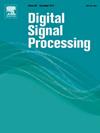Multi-rate fusion estimation for multi-sensor systems over Gilbert-Elliott channels
IF 2.9
3区 工程技术
Q2 ENGINEERING, ELECTRICAL & ELECTRONIC
引用次数: 0
Abstract
The distributed fusion estimation problem is discussed in this paper for a class of multi-rate multi-sensor systems. The measurements are assumed to be transmitted from the sensor to estimator over the Gilbert-Elliott channels governed by a two-state Markov chain due to the unreliable wireless network. Moreover, the probabilistic packet losses are considered in the Gilbert-Elliott channels, which is described by a random variable. The underlying system is measured by multiple sensors, where the sampling periods of sensors are integer multiples of the updating periods for system states. The above-mentioned multi-rate system is converted into a general single-rate one by the state iterative approach, and then a general system is put forward to characterize the dynamics from both the plant and transmission channels. Subsequently, the local estimators are devised to ensure the upper bounds of the estimation error covariances, and the estimator parameters are determined properly to minimize the derived upper bounds. In addition, the local estimates are fused by the covariance intersection method, and the corresponding consistency of the proposed fusion estimator is presented. Finally, a numerical example is given to illustrate the validity of the developed fusion estimation scheme.
求助全文
约1分钟内获得全文
求助全文
来源期刊

Digital Signal Processing
工程技术-工程:电子与电气
CiteScore
5.30
自引率
17.20%
发文量
435
审稿时长
66 days
期刊介绍:
Digital Signal Processing: A Review Journal is one of the oldest and most established journals in the field of signal processing yet it aims to be the most innovative. The Journal invites top quality research articles at the frontiers of research in all aspects of signal processing. Our objective is to provide a platform for the publication of ground-breaking research in signal processing with both academic and industrial appeal.
The journal has a special emphasis on statistical signal processing methodology such as Bayesian signal processing, and encourages articles on emerging applications of signal processing such as:
• big data• machine learning• internet of things• information security• systems biology and computational biology,• financial time series analysis,• autonomous vehicles,• quantum computing,• neuromorphic engineering,• human-computer interaction and intelligent user interfaces,• environmental signal processing,• geophysical signal processing including seismic signal processing,• chemioinformatics and bioinformatics,• audio, visual and performance arts,• disaster management and prevention,• renewable energy,
 求助内容:
求助内容: 应助结果提醒方式:
应助结果提醒方式:


